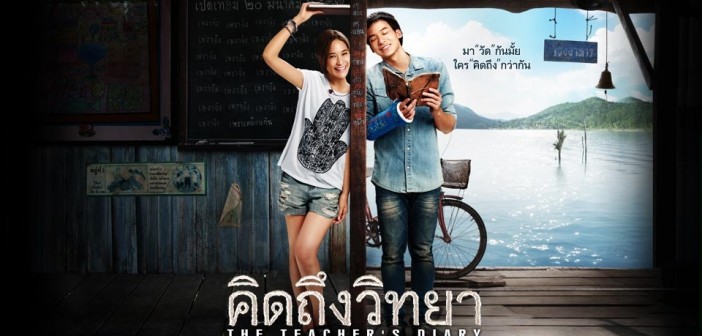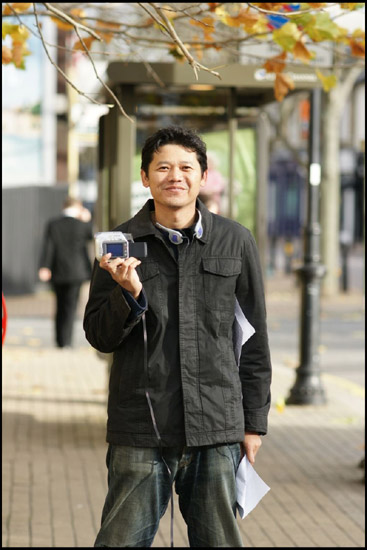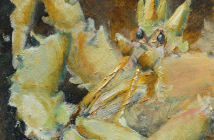Last week, saw the start to the three-day long Thai Film Festival at BAFTA on Piccadilly. The festival, put on by Thailand’s Ministry of Culture, aimed to highlight Thailand as an emerging epicenter for filmmaking in Asia. The festival’s seven featured films – ranging from romantic comedies to horror – showcased the breadth of films coming out of Thailand today and the marriage of tradition and modernity in Thai art.
The festival kicked off with a special screening of “The Teacher’s Diary” (2014), a lauded film that won six awards at the Thailand National Film Association Awards, including Best Screenplay and Best Cinematography. It’s a heartwarming film about two young teachers – Ann (Laila Boonyasak) and Song (Sukrit Wisetkaew) – who work at the same rural school just a year apart. When “Khrū Song” begins teaching, he’s shocked by the difficulties of living and working on a boat-turned-school; everything looks like it’ll fall apart. But he soon finds a former teacher’s diary (Ann’s), which details similar trials and tribulations. The ensuing film is filled with giggles, drama, romance, and even tears as Song and Ann become united through the diary. It’s sure to draw everyone who likes a good laugh, good acting, and a great story.
Many big names were in attendance for the viewing of “The Teacher’s Diary,” including the female lead, Laila Boonyasak, and the film’s director, Nithiwat Tharathorn.
Special guests spent the night taking pictures with the guests of honor at a reception, then laughing the night away in BAFTA’s theater.
We had the lucky honor to ask director Nithiwat Tharathorn a few questions about the film and his experience directing in general. This wasn’t Nithiwat Tharathorn’s first film – he graduated from one of Bangkok’s best film schools, Chulalongkorn University, before directing his first film in 2003, “My Girl.” Check out what he has to say about his experiences below.
Question: How did you get into filmmaking?
Answer: I started out as a film lover. I watched so many films when I was young, and that was the crucial start of my interest.
Q: Who or what inspires your work?
A: Everything really. Every film I watch inspires me. If you asked about my favourite I would say Cinema Paradiso, which is a film about filmmakers. It makes me want to make a good movie.
Q: You obviously work a lot in the romance genre – what draws you to that?
A: I don’t think my films are 100% romantic. The characters are in love, but it is not the main focus. I think a real romance film would focus more on how people get to be in love and how they deal with broken hearts, etc. But mine are more focused on other issues. “Teacher’s Diary,” for example, is more about education (which brings two people together).
Q: What’s most different about the Thai film industry than, say, Hollywood?
A: I think it is the size. Hollywood is massive. So, the money and target audience are also massive. I think it is not comparable as it is totally different in essence. Thai films are very particular and the industry is growing in a way it’s meant to grow. Now that the world has seen more Thai films: both what I am doing, which is more on commercial art side, as well as Thai art films which have now started to compete on an international level.
Q: What’s been your favourite movie thus far to direct and why?
A: I do like all the films I have directed. But the most impressive I would say is my very first I directed with my friends, “My Girl” (Fan-Chan) when we were very new in the industry. It is very special feeling to step up from a film student to be a director. Also it was six directors, six friends working on one film. So it was a very warm-hearted process of sharing ideas.
Q: What’s the most difficult aspect of directing a movie?
A: I think the process of compromising between what I want a film to be and what it can be is very difficult. Being a film director is about problem solving and compromising.
Q: What’s the most important aspect of filmmaking for you (i.e., the acting, cinematography, etc.)? Why?
A: Every aspect is very important. I think balancing all of these things is the most important job in making film. I am sure that you cannot get everything to 100% of you want it to be. So, finding balance is very important.
Q: What’s next for you?
A: I am definitely going to keep making films. I am in love with seeing the audience laughing and crying in the theater. This pushes me to want to make better and better films.
If you like this article you may be interested in “Cannes Film Festival to Host Russia’s First Erotic Movie”.






